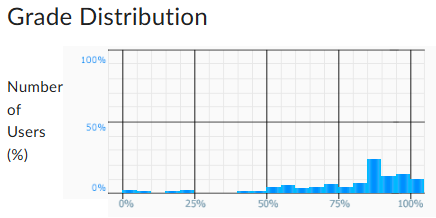Reading Stats from my World-building Students
I'm a big believer in using data to improve teaching, and, having just finished the midterm for my World-building class, ENGL 178, I was curious to see, among other things, how much of the assigned reading my students did. So I created an anonymous survey. Here are some results.
The one thing my regular students always complain about me being "too tought" a teacher. So, since ENGL 178 is a high-enrollment GE, I explicitly designed this midterm to be as easy as ethically possible. For most, three-quarters of the questions -- mostly multiple choice -- were recycled from the quizzes, and I gave everyone a clear breakdown on how the exam structure would look.
So this .... wasn't quite as bad as I feared, actually. According to one study, only about 20-30% students do the required reading. My students did a good deal better than that. Now, granted, there's a selection bias here. Only students who attended class today took the survey, and one might suppose non-attenders would, on the whole, tend to be non-readers as well. So I'll mentally subtract 10% from each book. At the same, my linked study studies a different population ("hospitality and tourism" majors), and I don't know how that would compare to students taking a 100-level General Education course.
DISCUSSION
Some positive results. Out of 65 respondents, 72% read The Hobbit. To me, that was impressive. Not only was it the highest percentage by far, but The Hobbit was also our longest text by a good chunk. I'm assuming four factors were involved:
- It was our first text, so new-semester enthusiasm was fresh;
- The adventures of Mr. Bilbo are an easy read;
- Quite a few of my students had (probably) read it before;
- Some students might have been more likely to read the book thanks to having seen the movies.
There's a decent drop-off after that, especially as we dove into medieval literature and mythology. Obviously, these are much harder texts. Only 1/3 students read The Saga of the Volsungs, for example. The page counts were very minimal, so that probably wasn't a factor. I suspect some students had decided by mid-semester that relying on lectures alone would be sufficient. (My lectures are very thorough.) A few of them even admitted this in their qualitative feedback.
Slightly more encouragingly, 53 total students (in question #3) claimed to have read at least half of the assigned pages. So even if we assumed all non-attendees were non-readers, about half the class read half the materials.
This metric isn't perfect either, though. For one thing, only 4 people claimed to have read everything, which is kinda heart-breaking. Plus the natural inclination to bunch your "total percentage read" slightly in your favor probably inflated the data. But I'll take some comfort in knowing, at least, that many students read at least one complete novel for this class ... and many more were exposed to medieval literature than might otherwise have been. Small steps.
Also, this was interesting:
The one thing my regular students always complain about me being "too tought" a teacher. So, since ENGL 178 is a high-enrollment GE, I explicitly designed this midterm to be as easy as ethically possible. For most, three-quarters of the questions -- mostly multiple choice -- were recycled from the quizzes, and I gave everyone a clear breakdown on how the exam structure would look.
So it's a bit jaw-dropping that "only" 32% of students thought this midterm easier than most other UA General Education courses. Over half the respondents thought it was "comparable." What the hell are those other teachers doing, giving out ice-cream eating contests as a midterm????? Grump, grump.
Nonetheless, if my goal was to create an "easy" class (which of course always helps enrollment), I seem to have succeeded.
For the record, here's the grade distribution of my midterm: -->
That big spike in the middle is everyone who scored 85-90%. So that's pretty much what I wanted. A (very) few people did poorly, which suggests at least some academic rigor in order to encourage effort. Of course, with the Legendarium Project itself, that'll be graded for completion. Thus I have reason to suspect that everyone currently getting a "B" will pull through with an "A" in the end.





Comments
Post a Comment